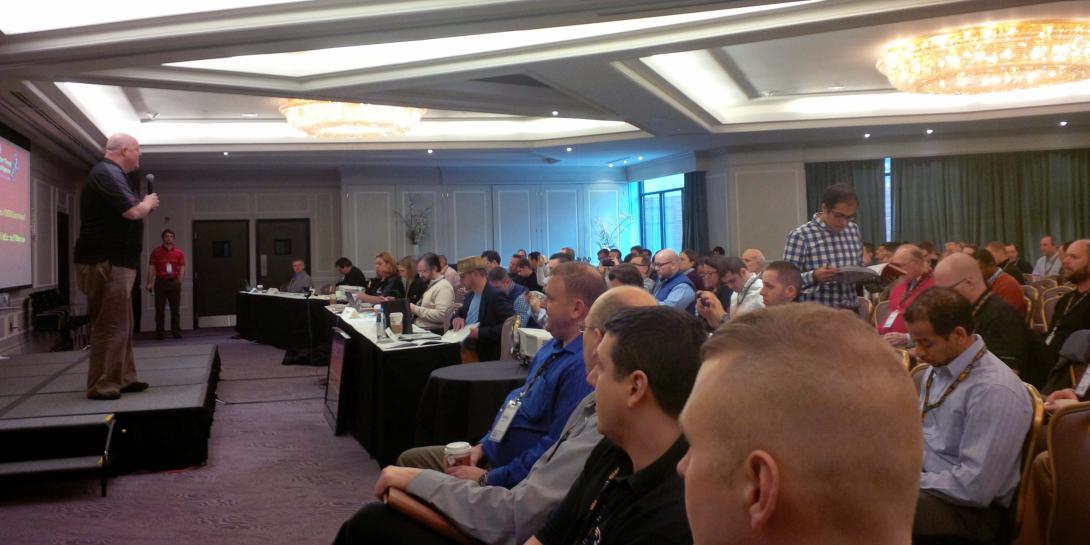Moving Military Cyberspace Veterans Into Industry
A private cybersecurity institute is plucking U.S. veterans with related experience, training them and placing them with commercial firms where they can help develop solutions that ultimately could benefit their former services. Government and the military increasingly are calling on industry to provide them with effective cybersecurity, and this program aims to tap the expertise of former military cyber warriors as part of that private sector effort.
Run by the SANS Institute, the VetSuccess Immersion Academy is free for many veterans, depending on logistics. The training inherent in the program is worth up to $30,000, and the institute looks to sponsors to help offset some of those costs. It is one of four programs within the SANS Cyber Talent Group designed to bring traditionally underrepresented groups into cybersecurity.
The effort emerged out of conversations with U.S. Air Force non-commissioned officers on transitioning veterans into the cyber industry, explains Jim Michaud, director of SANS cyber talent solutions. Ironically, the historical parallel is the need for military aircraft pilots at the outset of World War II, notes Alan Paller, the director of research at SANS who founded the program. Then, the United States quickly ramped up military aviation by establishing new flight schools across the country, and Paller sees cyber academies as the digital-era equivalent.
SANS does most of the internal security training for the Defense Department, Michaud notes, but he emphasizes that SANS talks only with veterans who already have left the service or have signed their transition papers. “We never would want to steal any cyber warriors who might want to sign up for another hitch,” he declares. The program also includes military spouses, he adds.
Individual applicants take a proprietary online exam that assesses aptitude and basic network information technology skills. SANS officials compare their scores with their resumes and the results from interviews, and then select appropriate candidates who will take up to three SANS courses, including its Global Information Assurance Certifications (GIACs). Individuals are paired with facilitators who help them prepare for the examinations, Michaud notes, and their third course is an elective designed to appeal to an applicant’s area of strength.
These courses are a mix of live and online sessions. Officials note a direct correlation between high scores on the assessment tests and success on the exams. Michaud describes the courses as “very hands-on.” They include labs that help nurture specific skills for cybersecurity.
Applicants comes to VetSuccess with a wide variety of backgrounds, he adds. While about half have information technology backgrounds such as radio or communications, many others are linguists and even truck mechanics. These nontraditional applicants passed their aptitude exams and performed well in the courses, Michaud relates. The diversity of the students' backgrounds is much greater than he thought it would be, he adds.
Some applicants actually are overqualified, he notes. SANS has an accredited GI-Bill-eligible master's degree program for those veterans. While rare, these students bypass the regular VetSuccess program because of their advanced expertise. “They could probably teach these classes, they’re that good,” Michaud allows.
When VetSuccess students pass their courses, SANS helps find them jobs with prospective employers. Some students find jobs on their own, Michaud says, while others benefit from the institute pairing them with an appropriate company. Some companies sponsor entire program academies, after which a graduate receives a contingent employment offer from the company. “We want the people who come out of this program to get fabulous jobs in the field,” he declares.
SANS has partnered with the Institute for Veterans and Military Families at Syracuse University. The two institutes are working on a nonprofit program known as Onward to Opportunity to build a VetSuccess academy at Joint Base San Antonio, home to the Air Force’s cyber organization, the 24th Air Force. SANS also is working with the USO at Joint Base Lewis-McChord in Washington through RallyPoint/6, Michaud adds.
Michaud relates that SANS conducted two pilot academies in 2015 for a total of 18 veterans. All the students passed and moved into good jobs paying up to $125,000, he says. This year, the institute scaled up the program to include a total of six academies, some of which are tied to businesses. Originally, most of the applicants came from the institute’s own outreach. Now, with more graduates moving into the field, interest is climbing. Applications far outnumber academy slots, although SANS is increasing the size of the program to meet industry demand. Michaud observes “there are way, way, way more openings in this field than there are qualified people to fill them.”
VetSuccess currently has about 50 students, and Michaud expects that number to double as the program ramps up late this year. Next year enrollment could be “in the hundreds,” he adds. The major factor limiting the size of the program is corporate sponsorship, as SANS does not have the resources necessary for large growth. The availability of qualified instructors also is an inhibitor. “There are not a lot of people who can meet our standards for quality, and we are not compromising those standards—ever,” he emphasizes.
The program will continue to seek increased employer sponsorship to enable greater growth. To help boost program visibility, VetSuccess is building an alumni network of graduates who could serve as spokespersons and “living role models,” Michaud says. The goal is to have more visibility in all branches of the service, particularly the Navy, Marine Corps and Coast Guard.





Comments